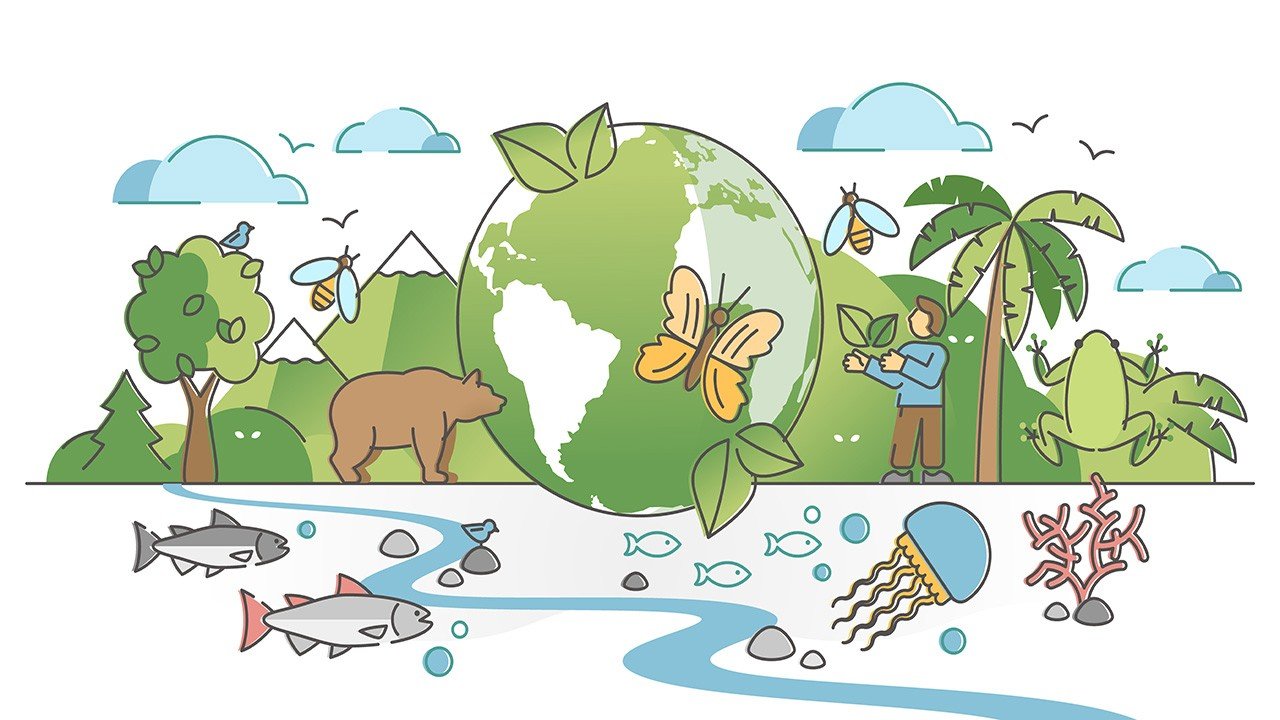The Importance of Conservation Efforts in Preserving Biodiversity
Biodiversity, the variety of life on Earth, is vital for maintaining the health of ecosystems, which provide essential services like clean air, water, food, and medicine. However, biodiversity is under threat from human activities such as deforestation, pollution, overfishing, and climate change. Conservation efforts are crucial to preserving biodiversity and ensuring the survival of species and ecosystems.
- Maintaining Ecosystem Services: Biodiversity supports ecosystem services that are essential to human survival, such as pollination of crops, water purification, and carbon sequestration. By conserving biodiversity, we protect these natural processes that sustain life and human well-being.
- Preserving Genetic Diversity: Conservation efforts help maintain genetic diversity within species, which is critical for resilience against diseases, climate change, and other environmental stressors. Genetic diversity enables species to adapt to changing conditions and helps prevent extinction.
- Supporting Economic Benefits: Biodiversity contributes significantly to economies through agriculture, pharmaceuticals, tourism, and recreation. Many communities depend directly on biodiversity for their livelihoods. Protecting biodiversity ensures the sustainability of these economic activities and resources.
- Cultural and Aesthetic Value: Many cultures have deep connections with nature and specific species that hold cultural, spiritual, or aesthetic value. Conservation helps preserve these cultural heritages and the intrinsic value of nature.
- Mitigating Climate Change: Healthy ecosystems, such as forests and oceans, play a critical role in regulating the climate by absorbing carbon dioxide. Conservation efforts that protect these ecosystems also help mitigate the impacts of climate change.
- Preventing Ecosystem Collapse: The loss of key species can lead to the collapse of ecosystems, resulting in a cascade of negative effects on other species and human populations. Conservation efforts aim to protect all components of an ecosystem to maintain its overall health and stability.
In conclusion, conservation efforts are essential for preserving biodiversity, which is fundamental to the health of our planet and the well-being of all living things. By taking action to protect and restore ecosystems, we safeguard the future for generations to come.


The Importance of Conservation Efforts in Preserving Biodiversity
Biodiversity, the incredible variety of life on Earth, encompasses the diversity of species, ecosystems, and genetic resources. It is a crucial aspect of the planet’s health, providing essential services that support human survival and economic development. However, biodiversity is under increasing threat from human activities, including habitat destruction, pollution, overexploitation, and climate change. Conservation efforts are vital in preserving biodiversity and maintaining the balance and resilience of ecosystems. Here, we explore the importance of these efforts in greater detail.
- Maintaining Ecosystem Resilience and Functionality: Ecosystems are dynamic networks of plants, animals, and microorganisms interacting with their environment. Biodiversity enhances ecosystem resilience by enabling ecosystems to withstand and recover from disturbances, such as natural disasters or human-induced changes. Diverse ecosystems are more stable and capable of maintaining their functions, such as nutrient cycling, soil formation, and climate regulation. Conservation efforts focus on protecting these diverse networks, which ensures that ecosystems can continue to function effectively and support all forms of life.
- Protecting Endangered Species: Many species are on the brink of extinction due to habitat loss, poaching, pollution, and climate change. Conservation efforts prioritize protecting endangered species through various strategies, including establishing protected areas, breeding programs, and legislation to prevent illegal hunting and trade. By conserving these species, we maintain biodiversity and the ecological roles they play within their habitats. Each species contributes uniquely to its ecosystem, and losing one can disrupt food webs and ecosystem processes.
- Safeguarding Human Health: Biodiversity has direct links to human health, providing a wealth of resources for medicine and disease prevention. Many pharmaceuticals are derived from natural compounds found in plants, animals, and microorganisms. A diverse gene pool allows scientists to discover new medicines and treatments. Furthermore, healthy ecosystems act as buffers, reducing the transmission of zoonotic diseases from animals to humans. Conservation efforts that maintain biodiversity can help prevent future pandemics and support the discovery of life-saving drugs.
- Enhancing Food Security: Biodiversity is fundamental to global food security, underpinning agriculture and food production systems. Genetic diversity within crops and livestock breeds enables them to adapt to changing conditions and resist pests and diseases. Wild species and natural ecosystems contribute pollination services, pest control, and soil fertility, all of which are vital for sustainable agriculture. Conservation efforts that protect wild species and their habitats contribute to the resilience of food systems and help ensure food security for future generations.
- Promoting Sustainable Development: Biodiversity and ecosystem services are integral to sustainable development, supporting the livelihoods of millions of people, particularly in developing countries. Many communities rely on natural resources for their daily needs, including food, water, fuel, and medicine. Conservation efforts promote sustainable resource use, ensuring that these resources are available for future generations. By integrating biodiversity conservation into development planning, we can achieve sustainable development goals that balance economic growth, social equity, and environmental protection.
- Combatting Climate Change: Biodiverse ecosystems play a critical role in mitigating climate change by acting as carbon sinks. Forests, wetlands, and oceans absorb significant amounts of carbon dioxide, reducing greenhouse gases in the atmosphere. Conservation efforts that protect and restore these ecosystems help to combat climate change. Additionally, diverse ecosystems are more resilient to the impacts of climate change, such as extreme weather events, ensuring that they continue to provide vital services to humans and wildlife alike.
- Supporting Ecosystem-Based Approaches: Conservation strategies increasingly emphasize ecosystem-based approaches, which consider the entire ecosystem rather than focusing on single species. This holistic view recognizes the interconnectedness of all species and their habitats, promoting actions that maintain or enhance the health and functionality of entire ecosystems. By preserving entire ecosystems, conservation efforts ensure that the needs of various species and human communities are met sustainably.
- Preserving Cultural and Natural Heritage: Biodiversity is deeply intertwined with cultural identity and heritage for many indigenous and local communities. Certain species and ecosystems hold significant cultural, spiritual, and traditional value. Conservation efforts help protect these cultural connections by safeguarding the natural environments that sustain them. Moreover, these efforts preserve traditional knowledge and practices related to biodiversity management, contributing to a more holistic understanding of conservation.
- Encouraging Public Awareness and Education: Effective conservation relies on public awareness and education about the importance of biodiversity. Raising awareness about the critical roles biodiversity plays in our daily lives and the threats it faces can inspire people to support conservation efforts. Educational programs, community involvement, and media campaigns can help foster a sense of stewardship and responsibility toward nature, promoting a culture of conservation and sustainable practices.


- Fostering International Cooperation and Policy Development: Biodiversity conservation is a global challenge that requires international cooperation and coordinated policy efforts. Many conservation issues, such as climate change, deforestation, and wildlife trafficking, cross national borders and require collaborative solutions. International agreements, such as the Convention on Biological Diversity (CBD), aim to unite countries in efforts to protect biodiversity. Effective conservation efforts often depend on the strength of these agreements and the willingness of nations to implement and enforce them.
In conclusion, conservation efforts are indispensable for preserving biodiversity, which is foundational to the health of our planet and the well-being of all life forms. By protecting ecosystems, species, and genetic diversity, conservation efforts help maintain the balance and resilience of the natural world, ensuring a sustainable future for humans and the countless other species with whom we share the Earth. The continued support and expansion of these efforts are crucial to safeguarding our planet’s rich and diverse life forms for generations to come.



